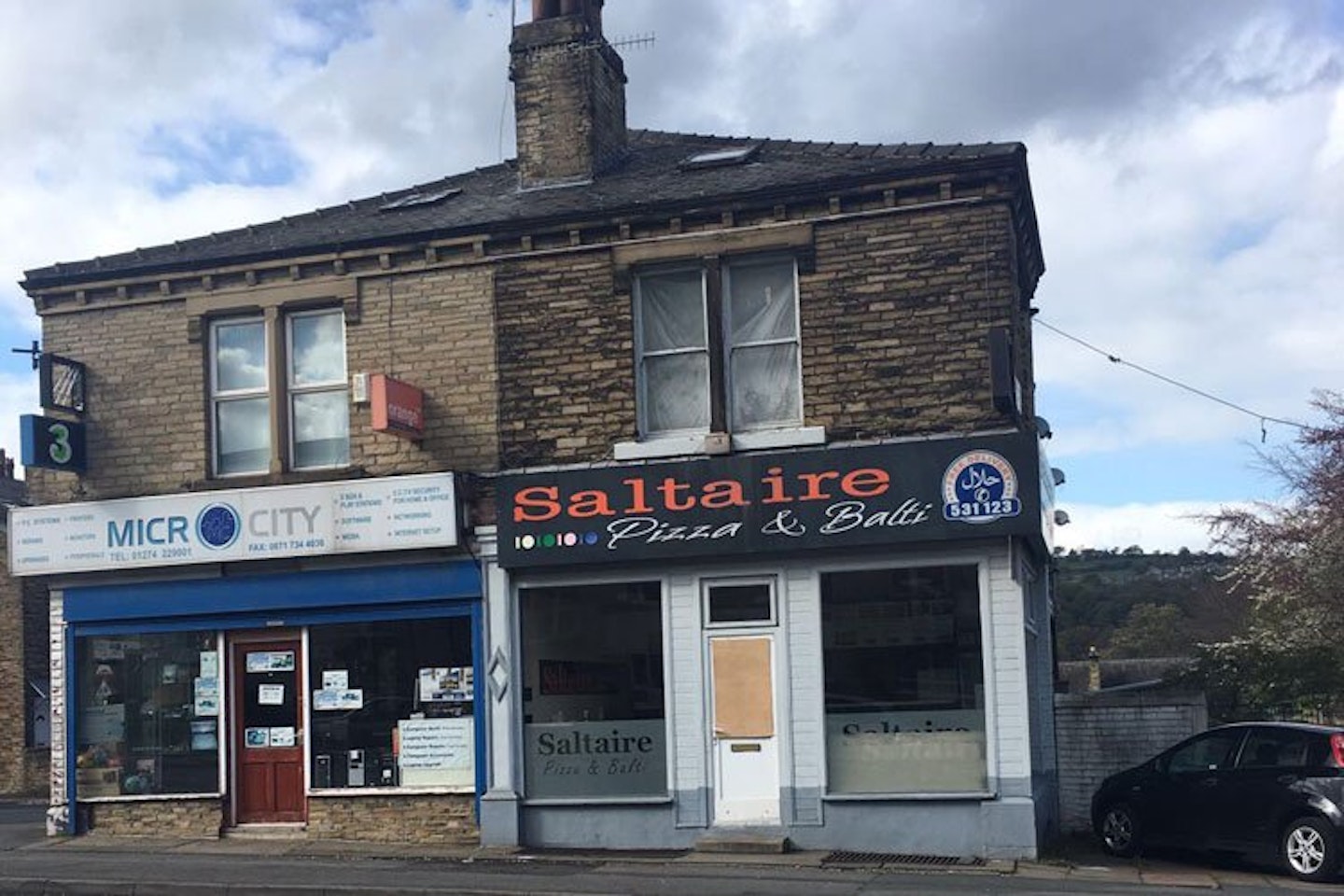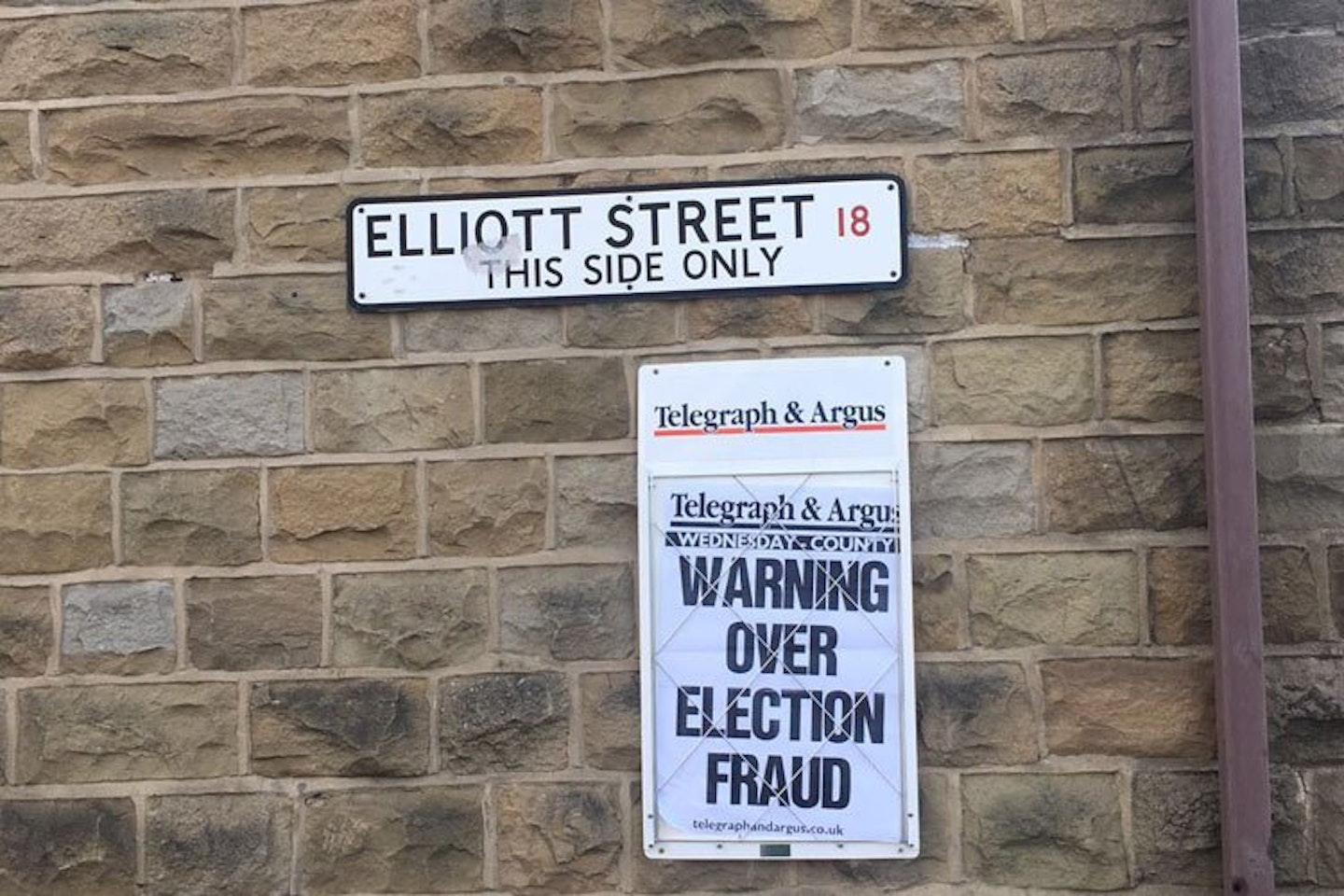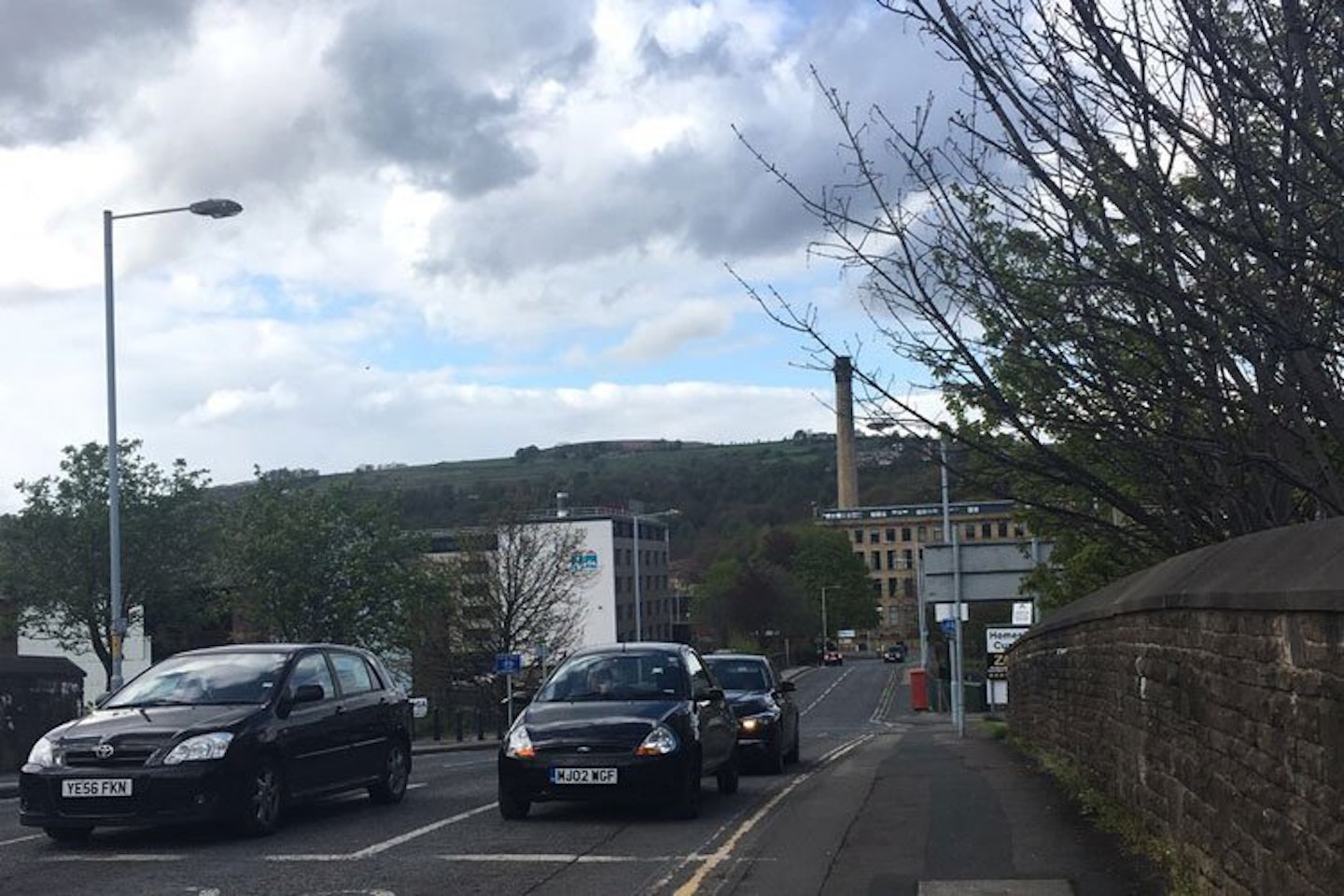‘They don’t really care though, do they?’ she tells me, leaning on the counter in the nail shop cum tanning salon, ‘I mean…we vote but they’ve already made up their minds. The decision gets made behind closed doors. Our votes don’t matter. They've already decided anyway’ We’re in Shipley, Jodie is 26 years-old and self-employed.

Two-and-a-half hours from London, Shipley in West Yorkshire is slightly larger than its more famous neighbour, Saltaire. Both towns sit on the outskirts of Bradford and a little North West of Leeds. Saltaire is a living museum; a Victorian model village and UNESCO World Heritage site. Walking around England’s industrial past not only looms large but is perfectly preserved. Red brick chimneys, factories and neat stone workers’ cottages punctuate the surrounding green rolling hills and line main roads. Industrial Revolution era buildings shape the skyline beyond Shipley's town centre. During the Industrial Revolution this area was the glute of our country. It did the heavy lifting.
Nearby Leeds delivered a narrow win for remain in last year’s EU referendum but the constituency of Shipley itself voted to leave, much to the delight of the area’s Conservative MP, Philip Davies, a staunch Eurosceptic who described himself as ‘elated’ on hearing the news. Neighbouring Bradford, expected to be a safe haven for the remain camp, delivered a small majority for leave.
So far, I’ve yet to meet a single person who voted remain here. On the face of things, this is an unlikely hotbed of feminist activity, but since the announcement of a snap general election it has made headlines after Sophie Walker, leader of the Women’s Equality Party, announced that she would run here against Davies.
Shipley’s MP since 2005, Davies is a contentious contrarian and proud anti-feminist. He admires Donald Trump , he would have voted for him ‘in a heartbeat’ and agrees with Nigel Farage on ‘virtually everything’. Davies is a standard bearer for the anti-political correctness police and spends much of his parliamentary time actively trying to derail legislation which will benefit women. It is also well documented that he has sent multiple Freedom of Information requests to the equalities commission in an attempt to find out why people think ‘blacking up’ is offensiveand has also said that these days ‘feminist zealots want women to have their cake and eat it’.

It is because of this that the fledgling Women’s Equality Party have set his seat in their sights, although they are putting forward candidates elsewhere too. While there has been a local branch of the Women’s Equality Party in the area for six months, it is also worth noting that a group who call themselves the Shipley Feminist Zealots have been marching and organising against him for some time. Walker has said she was standing against Davies because he is ‘basically a sexist misogynist who puts his own ego ahead of his constituents.’ Davies denies the charges levelled against him, arguing that all he has ‘ever said…is that all legislation should apply equally to men and woman’. ‘How that can be sexist is beyond me’ he added, ‘it is Ms Walker who is a politically correct sexist as she clearly opposes legislation treating men and women equally and she also believes in positive discrimination.’ The two clashed on Radio 4’s Today Programme, achieving little more than the politically correct versus anti politically correct conversational stalemate we’ve become so used to in recent months courtesy of the likes of Trump and Farage, of which Davies himself is something of a poster boy.
Davies himself tells me that he’s ‘perfectly happy for the Women’s Equality Party to run. I believe in democracy so the more people the public have got to choose from the better’. He says that their tactics are ‘the typical tactics of the “politically correct brigade”, they know that their views are unpopular so they resort to personal smears. It’s an attempt to try and bully people into not speaking out but, I’m not prepared to be bullied…’
I list some of the times when he has deliberately obstructed legislation which aims to increase women’s rights, such as the Istanbul Convention. He replies, ‘I don’t believe that laws should only apply to one gender…everybody should be treated equally by the law. That’s the whole premise on which our legal system in this country is based.’ The Convention, which represents a comprehensive legal framework outlining the minimum standards for a State’s response to violence against women and girls guarantees also required the protection of funding for domestic violence shelters, rape crisis centres, helplines and counselling for domestic abuse survivors as well as the provision of education on health relationships in schools. When I put this to Davies, and say that when more women than men are subjected to domestic violence so surely we do need laws like the Istanbul Convention, he says ‘well there are more men affected by murder than women, should we only care about male murder victims’ which sort of seems like the debating equivalent of saying ‘BUT WHAT ABOUT WORLD HUNGER!!!!'. It's important but separate. I ask Davies if he would describe himself as a men’s rights activist? ‘No’, he says. The truth is that he is convincingly pitching himself as a straight-talking, no bullshit guy who doesn’t have time for snowflakey feminists to those who don’t watch BBC Parliament, read about FOIs or scour Hansard for kicks.
Walker, the leader of a new party at a time of political turbulence and change, tells me ‘we are trying to do this differently’. The Women’s Equality Party (WE) was set up to be a party for people who had felt shut out of politics, for people who felt on the outside of the system and for people who felt like the current approach wasn’t working for them’. She says part of the reason that Shipley was at the top of her party’s list is because there is a need for ‘strong opposition with equality at the top of the agenda.’
Walker says that it was always her party’s intention to field candidates when this General Election inevitably came around. She hopes that WE’s campaign in Shipley will put equality on the agenda, ‘Brexit is the template for this election, but ultimately the decision that people will be voting on are very close to home. We’re living in a time of huge uncertainty and it’s even more incumbent on MPs to consider where we are, where we’re going and to make sure that they’re ensuring equal opportunities. I am particularly going to be campaigning for a different kind of investment in people as we go towards this final Brexit deal’ Walker says. What does that look like? ‘I want us to be investing in social infrastructure, I think it’s really important that we recognize that’s a really key economic motor: affordable childcare, access to good social care, valuing carers and paying them well.’
In recent years, all over Britain, traditional, orthodox two-party politics has been disappearing before our eyes. Even the Leader of the Labour Party is now a self-styled anti-establishment figure. This trend is being reflected in the US, where a former reality TV star is now President, and Europe where the far-right Marine Le Pen is edging ever closer towards the presidency. However, while this has certainly pushed what were once fringe issues up the political agenda and into the public consciousness, meant gains for the SNP and, fleetingly, saw the Liberal Democrats back in Downing Street for the first time in almost a century, it hasn’t always translated into votes or MPs for the Greens or UKIP.
Is WE’s decision to run in Shipley something of a politically correct storm in a teacup, or a signal that women will no longer stand for men in public life undermining and, worse, thwarting attempts to address the imbalance between men and women? Could a feminist party, fielding a feminist candidate engage people and, even, win an election in Shipley under the cloud of Brexit? Or, was this is a misguided attempt by the maligned liberal elite intelligentsia to rile up the press with their #feminism?

Back in the tanning salon and nail bar I ask Jodie and Toni, who is also 26. Like the rest of the town, it was quiet in the shop. Had they heard all the fuss about the Women’s Equality Party, what do they make of it? I have no idea to be honest’ Jodie says, ‘I couldn’t even tell you one thing about the election’, Toni added. However, she reveals that she voted to leave the EU in the referendum last year. Why? ‘I’ll be totally honest it’s because my mum and dad voted out and I voted with them. Toni didn’t vote, ‘I know I probably shouldn’t have this mind set but I just thought they’d probably already made their decision so why do normal people like us even be taken into consideration’ she told me.
Neither Tony nor Jodie know who their MP is but when I play them a video of Davies and show them the articles reporting on his comments about ‘feminist zealots’ and explain that the Women’s Equality Party are running against him because he’s ‘sexist’ they laugh in unison and say ‘oh right another one!!’. Toni says she probably wouldn’t vote for him, knowing what she now knows because ‘it’s going against us, as women’. Toni says men shouldn’t vote for him either because ‘it’s not fair to judge a gender like that, we could say that about men’ but when I ask if she would describe herself as a feminist she says ‘not really, no. I don’t know why.’
Both Jodie and Toni are disillusioned and uninspired by politics. They don’t feel like it relates to them. Why? ‘The thing that puts me off’ Toni says, ‘is you see them all preaching “oh I’ll change this, I’ll change that”, and then when you think “oh yeah that sounds good:” 9 times out of 10 none of that happens.’ ‘Parliament already has the decision made I reckon’ says Jodie, ‘regardless of what we want to change. People like us, who are self-employed, they were going to change it so we had to pay more tax so…’ When it comes to politicians, mainstream or otherwise, it would take a lot to convince these young women that those vying for power have the interests of ‘ordinary people’ at the front of their minds. They say this is reflected in the views of the majority of their customers, all of whom wanted to leave the EU.
The overwhelming takeaway from my conversation with Toni and Jodie, was that they genuinely felt there is ‘no point in voting’. ‘They’ve already made the decision haven’t they’ says Jodie, ‘[elections] are just for show’. This sort of disenfranchisement echoes throughout the town, the sense that ‘Westminster doesn’t care about us’. It would be easy to label them apathetic millennials but, surely, this is a criticism of the political education we receive at school, and more than that, of glaring political failure after failure which has sent people the message that neither they nor their opinions are valued: Iraq, the MPs expenses scandal, austerity, the tuition fees hike.
Next stop, Costa. This was more because of necessity than design, it was cold and I was thirsty. Three young women were working there, one 17 the others in their twenties. What did they make of it all? ‘To be honest I don’t really know much about politics’ replied the youngest. Did she consider herself a feminist? ‘Errrrr’ the hesitation wasn’t pointed, it was genuine, ‘I guess so’. The others said they were ‘too busy to think about this stuff’, ‘this stuff’ being politics. None of them knew that the Women’s Equality Party were running in their area and shared a sense, held by many, that their vote wouldn’t matter anyway.
I move on, walking towards Saltaire passed a fair few unopen shops despite the fact it’s the middle of the afternoon. Unemployment in the district rose slightly last year, although it remained overall lower than it had been in 2015. I meet with 30-something Ruth who grew up in the area and went to university in Leeds and 24-year-old Rosie in a pub, she currently sells school uniforms in a call centre in Bradford which, she says, ‘is very boring but in September I’m hoping to become a teacher’. She went to university in Birmingham and wanted to stay in her hometown afterwards instead of following the herds down to London, ‘everyone I love is here’, she says. But, after graduating, she couldn’t find a job, ‘I wanted to be here with my friends and family so I took a minimum wage job in a call centre…the only jobs you can find around here are call centre jobs and they’re terrible but I didn’t want to move away.’ As Rosie sees it we have a massive problem with what she terms ‘regional gentrification where all the young people feel like they have to move to London and Manchester which means a lot of young people are moving out of places like this and it’s bad for the area…it’s dying.’
So what are the main issues facing Shipley as they see it? The issues facing people in this constituency are, Rosie says, wide-ranging: ‘there are people using food banks and other people worried about farming grants from the EU.’ How did these two vote in the referendum? They both voted remain but, says Ruth, ‘I can understand why people voted to leave’. In her view the referendum was about ‘the underlying economic issues facing an area like this…look…a lot of people can’t even afford a passport! It’s expensive!’

Rosie tells me did work experience with Philip Davies when she was 18. ‘I sat in his surgeries and saw how he treats his constituents and it would really depend on who was asking the question and what the question was…one issue that really stuck in my mind was a woman who was a sexual health teacher, asking him why services were being cut and he was very dismissive.’
Neither Rosie nor Ruth are fans of their MP, so what do they make of the Women’s Equality Party’s decision to run here? ‘Well, Rosie says, he is a local man. He hasn’t been parachuted in and he helps local people with their problems (unless he has different political views to them). Ruth feels that, instead of standing in Shipley, the Women’s Equality Party should defend local Labour women MPs like ‘Paula Sherriff or Naz Shah’, Sherriff in particular has a very small majority. ’I’ve got endometriosis’ Ruth explains, ‘and one of the things Paula has worked on is drawing attention to the fact it takes 10 GP appointments before women are diagnosed’. Does support for the two parties have to be mutually exclusive? ‘To me’ she says, ‘it’s always been clear that the women’s equality party are the Labour party…they bought in the first equality legislation in the 1970s. The commitment to equality is even written on the back of our membership card.’
Finally, I speak to a local Women’s Equality Branch member. Cat is in her early thirties, she’s voted Labour, Liberal Democrat and Green in the past. ‘I had never previously been a member of a political party and for me that’s a really big deal because I never felt that a party before the Women’s Equality Party got it – I never felt like a party had spoken to me. The Women’s Equality Party for me, really is how I’d like to do politics. I never felt like a political party represented me before.’
Does she agree with some of the local Labour voters and worry that the Women’s Equality Party’s presence could split the vote in Shipley? ‘The issue of splitting the vote is always levelled at a new party,’ she says, ‘it was levelled at the Labour party when they were a new party’. She adds that she joined the Women’s Equality Party because she doesn’t ‘see Labour or any party prioritising gender equality’. For her, this ‘lies at the heart of the problems they’re trying to solve and I don’t see a genuine or sincere commitment to gender equality from them. I know that there are other issues – NHS, the environment – we all care about that too but if you relegate gender equality to the back of the manifesto then you’ve misunderstood the point.’
On the way back to the station I stop off to pick up snacks for the train from a corner shop. I ask the owner what he thinks of the election and the sudden interest in Shipley in particular? ‘Davies is a good man’ he tells me, ‘he’s helped friends and family with immigration issues. He helps local people. He’ll be fine. Brexit is going to be fine too, you’ll see.’ What does he think of the Women's Equality Party, 'he laughs, oh that', and Corbyn? 'Come onnn'.
Before the 2015 election pundits hailed a 'new kind of politics'. It was a six-party politics now with UKIP, the Greens, the Lib Dems, the Tories, Labour and the SNP all vying for power. We’ll probably see another hung parliament, they said. Instead, David Cameron won again with a majority albeit it a small one.
Now, with Theresa May’s ‘strong and stable’ government campaigning on a ‘Brexit means Brexit’ ticket, UKIP relegated to near insignificance and the Labour Party turned into a ghost ship, this country feels more like a one-party nation. And, if local election results are anything to go by, it is becoming one.
Last summer we had a referendum on the European Union which was fought, by individuals, like an election. Now, we face an election which is being fought like a referendum on our government and Brexit. And, just as the referendum was about more than Europe, the Women’s Equality Party want to make this election about more than Brexit. Whether they can reach Shipley’s disillusioned and disenfranchised remains to be seen. The conversations I had about feminism in Shipley, as conversations about Europe so often do, were marked by class and inequality. Those who had been to university (with or without the help of grants which have now been cut) were pro European feminists who loathed Philip Davies. Those who hadn’t been, didn’t believe that Westminster cares about what they have to say and wouldn’t listen even if they were shouting from the rooftops.
*Bursting The Bubble is our look at the election through the eyes of our readers around the country, whatever their political affiliations, in an attempt to burst through the social media bubble and see what young women in the UK really think about the state of politics today. *
**Liked this? You might also be interested in: **
Here Are All The Places Where The Women's Equality Party Are Standing In The General Election
Follow Vicky on Twitter @Victoria_Spratt
This article originally appeared on The Debrief.
